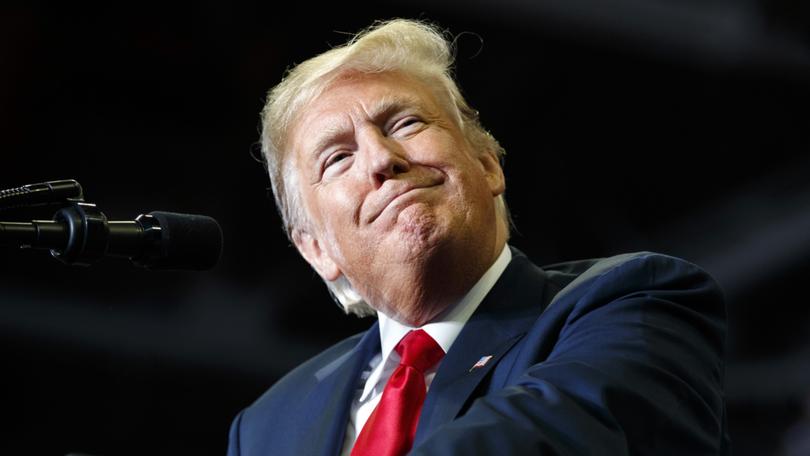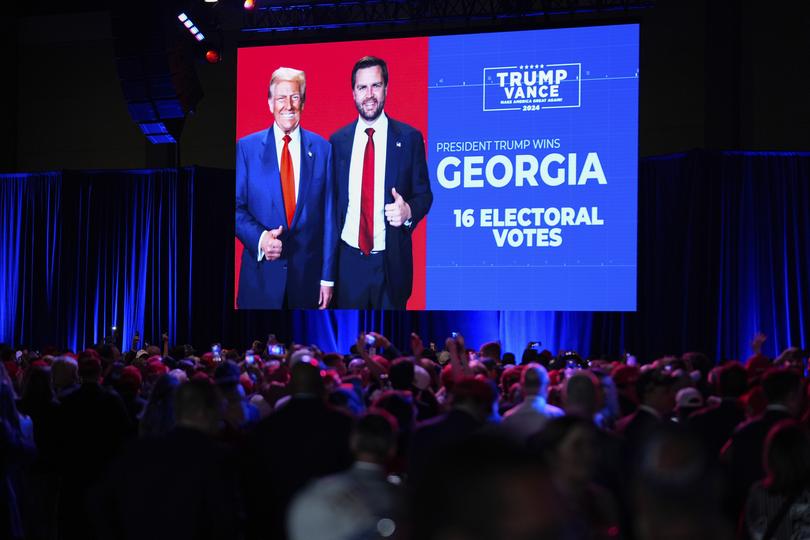US election: Donald Trump’s big election gamble has paid off
Donald Trump bet the US election race on young male voters and, as he nears a victory, it seems that gamble has paid off.

Donald Trump’s campaign assessed since the summer that the voters who could tip the election skewed young and male.
Rather than chase traditional Republican constituencies such as suburban and college-educated women who were drifting away from Trump, his advisers bet on activating young men, Black men and Latino men, who historically voted less reliably. With that goal, Trump sought out predominantly male audiences in nonpolitical settings such as mixed martial arts matches, a car race and podcasts recommended by his 18-year-old son, Barron.
Sign up to The Nightly's newsletters.
Get the first look at the digital newspaper, curated daily stories and breaking headlines delivered to your inbox.
By continuing you agree to our Terms and Privacy Policy.Preliminary exit polls showed signs of that gamble paying off. First-time voters made up a smaller share of the electorate than in 2020, but this time they narrowly favored Trump. In 2020, the group preferred Biden two to one.
“Before I didn’t think it affected my life. It was something older people did,” said Austin Crawford, 35, who voted for the first time in his life on Tuesday at a church in Lee’s Summit, Missouri, a suburb of Kansas City. “I should have been voting the whole time.” Crawford said he voted for Trump because of affordability, safety and international standing, and he also voted for a state constitutional amendment guaranteeing abortion rights.
Vice President Kamala Harris, on the other hand, was counting on a surge of support from women to make her the first female president. It was not clear late Tuesday whether she got enough.
Adriane Smith, 54, a Black nurse and farmer from Coralville, Iowa, said anger over the state’s six-week abortion ban was driving women to vote for Harris. “Now we see a quiet storm of women voting their concerns at the ballot box,” Smith said.
Early exit polls found women favored Harris by 10 points, compared with President Joe Biden’s 14-point advantage in 2020. Men preferred Trump by 10 points, up from nine four years ago. Results are preliminary and change as additional interviews are included and results are weighted to match vote tallies by region.
The early exit polls found over half of voters nationally were women, roughly the same as the share in 2020, according to exit polls that year. White women rose to about 4 in 10 voters, according to preliminary exit polls, compared with 32 percent in 2020.
In Pennsylvania, early exit polls showed that women broke for Harris by 12 points while men sided with Trump by 14 points, compared with 11 points for both in 2020.
The split between the genders was thought to be so pronounced that as Election Day drew to an end, Trump surrogates explicitly called for men to come out to vote. Trump adviser Stephen Miller and activist Charlie Kirk took to social media on Tuesday evening encouraging men to head for the polls.
“All the men of America need to fulfill their duty, get to the voting booth, and end the invasion once and for all,” Miller wrote, referring to undocumented immigration.
In addition to gender, Americans divided based on education. Nationally, about 6 in 10 White women with college degrees voted for Harris, including similar shares in the swing states of Michigan, Pennsylvania and Wisconsin. White men with college degrees were about evenly split, according to early exit polls.
Clear majorities of both men and women without college degrees backed Trump, including two-thirds of White men without college degrees.

Preliminary exit polls showed Trump overperforming his past results with other historically Democratic constituencies, such as Latinos and young voters. Voters between the ages of 18 and 29 nationally supported Harris by about 10 percentage points; Biden won the age group by a 24-point margin. Harris won a slight majority of Hispanic voters nationally, dramatically trailing Biden’s 33-point advantage in 2020. About half of Latino men supported Trump this year, up from 36 percent in 2020.
Harris performed better than Biden among voters 65 and older, who split their votes about evenly this year. Trump won seniors by five points in 2020.
Harris and her party had spent the years since Roe v. Wade was overturned aggressively courting female voters, confident that furor over Republican efforts to restrict abortion access would send furious women to the polls. Harris argued, forcefully and repeatedly, that Trump was responsible for Roe’s downfall, that a second Trump presidency would mean further restrictions on abortion rights and that the prohibitions could bleed over into other aspects of American life.
That message resonated with many voters like Emily Willis, a 28-year-old medical student in Suwanee, Georgia, who lives in one of the nation’s hotly contested battleground states, which saw visits from both presidential candidates in the race’s closing days. About 1 in 10 voters nationally said abortion decided their vote, trailing other issues such as the economy or democracy.
Since Roe v. Wade was overturned, Georgia’s six-week abortion ban has been on Willis’s mind, especially after she became pregnant in February. She said she gave birth to her first child three weeks before she cast a ballot. Hers was a planned pregnancy, but she was adamant that the decision to terminate a pregnancy should be a woman’s.
“It’s always men, and men without medical backgrounds, making decisions for women,” Willis said, adding that women “want a voice.”

As vice president, Harris has been out front in the White House’s efforts to galvanize angry women against Trump, saying Roe was overturned because of a pair of Supreme Court appointments made by the former president and labeling the decision “Trump’s abortion ban.”
“This is a health-care crisis. And Donald Trump is the architect of this crisis,” Harris said during an abortion-focused speech in September. “He brags about overturning Roe v. Wade - in his own words, quote, ‘I did it and I’m proud to have done it.’ He says he is proud.”
In March, Harris became the first sitting president or vice president to tour an abortion clinic, and earlier this year she went on a reproductive rights tour through battleground states. Harris supporters have even left notes in women’s bathrooms, reminding people that ballots are secret and that women should vote in their own self-interest, regardless of what the men in their lives say.
The outrage over Roe’s overturn stanched a predicted “red wave” of Republican gains in the midterm elections and Democrats hoped women would also lend their support to the woman trying to become the nation’s first female president.
First-time voter Adriana Rodriguez said her cousin had a life-threatening medical condition during pregnancy and that she worries Republican abortion restrictions endanger women. “I never felt my vote would count, so why should I go,” said Rodriguez, 32, of Las Vegas. “But this time it really feels like it affects me.”
Ever since Harris’s ascension to the national stage, she was long thought to be the natural inheritor of the multiracial, multiethnic coalition that put Barack Obama in the White House. Harris’s mother was from India and her father is a Jamaican immigrant. She is the first vice president to graduate from a historically Black college - Howard University in D.C., where she held her election night party. It seemed a perfect fit for the “big tent” of the Democratic Party, which is increasingly powered by Black women and other minority voters.
Trump’s overtures to women voters centered on vowing to “protect” them and stating his support for in-vitro fertilization by calling himself the “father” of the procedure.
In the closing month, Harris spent considerable effort trying to court what many thought would be another natural electorate: Black men. Some polls showed that the demographic’s support for Harris didn’t reach its level of support for Biden or for Obama. Harris engaged with Black media and was aided by perhaps her top surrogate, Obama.
Trump’s campaign saw an opportunity to extend gains with men to Black and Latino voters, usually through economic appeals. Pollsters said disillusionment with politicians from both parties drew some voters to Trump.
“You could vote till you was 90 years old and still not vote for anyone who’s going to fix everything,” said Shane Burgess, a 58-year-old laid-off autoworker in Detroit who voted for Trump. “Maybe it’s a bad vote, we’ll see.”
Harris dashed to urban areas, including Philadelphia, Detroit and Erie, Pennsylvania, to meet with Black entrepreneurs and highlight what she called her “Opportunity Agenda for Black Men,” aimed at helping the group build wealth, expand their access to lending and help them start or expand businesses. But that lack of enthusiasm comes as some Democrats conceded that the party has not always focused on Black men enough or kept all its promises.
Some of Trump’s overtures offended Black Americans, such as saying he gained support because he had a mug shot or that immigrants were taking “Black jobs.” Still, small inroads with a traditional Democratic bedrock had the potential to decide pivotal states.
Early exit polls from Georgia showed a similar share of Black voters supporting Democrats as in 2020. About 8 in 10 Black men and about 9 in 10 Black women supported Harris, according to Georgia’s early exit polling. In 2020, 92 percent of Black women and 83 percent of Black men supported Biden.
- - -
Anumita Kaur in Georgia, Emily Guskin in Washington, Laura Benshoff in Philadelphia, Robert Klemko in Las Vegas, Annie Gowen in Iowa, Kim Bellware in Michigan, Holly Bailey in Atlanta, Leigh Ann Caldwell in Florida and Aaron C. Davis in Detroit contributed to this report.
© 2024 , The Washington Post
